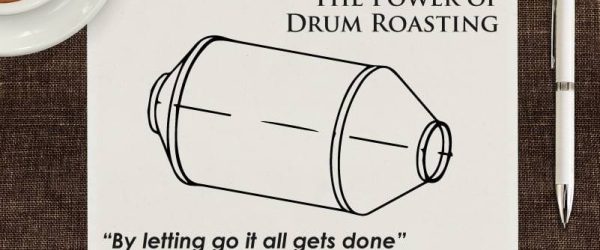We wish to highlight the advantages of roasting with a mechanical sample coffee roaster as opposed to electronic hot air roasters used for quality control of coffee. Some of the points raised below certainly also apply to commercial drum roasters in general.
Without opposing technology, let us objectively examine why traditional drum sample roasters have a number of considerable advantages over high tech driven hot air roasters.
Advantages of traditional sample drum roasters
Transferability: Today, 95% of all coffee is roasted on drum roasters and not by hot air method due to a factor of complex reasons such as tradition and taste. In this context, it means that with a hot air sample roaster you can’t accurately transfer the result of the sample to your production site unless you are also producing on a hot air roaster, which few roasters actually do. It goes without saying that the results differ substantially between roasting with convective, conductive and radiant heat transfer.
Control: There is full manual control over the roast when roasting on a traditional sample roaster. This means you can at any time increase heat, airflow or terminate manually. No inspection of beans is possible during roasting in hot air roasters as they require closed chambers to function. This is a major drawback as for instance you can’t properly hear the cracking sound, you can’t judge by the smoke, the smell of the beans and the overall sound they make. This means that you could completely miss a critical point where incredible aromas are being developed and be completely unaware of it. It has often been said in the coffee community that roasting is more than just temperature, time and color. When technology dominates, how much control would a master roaster lose and to what degree could he maintain his overall connection to coffee? After all, most coffees that are sample roasted are new and often lead to a decision to purchase. We believe that there lays a big advantage in being able to closely monitor the behavior of each coffee during their sample roasting process which may well be their first roast ever.
Repair and longevity: Let’s use the example of cars. Nowadays, if you open the motor of a modern car, all you can really do is wipe dust. Do you think the average roaster could repair a high tech roaster with all its chip components if it breaks down? Most matters would depend on the manufacturer and thus it is not empowering to the final user. Spare parts and replacements can be very expensive whereas traditional roasters are easy to repair and in the case of our Sample PRO 100 particularly manufacturer independent. This aspect is especially important in origin countries where limited supply and high shipping costs are an obstacle. Most interestingly it’s a fact that university graduates in the 21st century are predominantly educated to design products that are semi-disposable and last no longer than 2-3 years. This leads us to the question whether high tech roasters can have a longer life span than the average ink-jet printer or toaster.
Flexibility: You can’t roast multiple batches at the same time. Traditional drum sample roasters have multiple drum units of 2,4 or 6 drums resulting in higher efficiencies and flexibility.
Ethics and evolution: We live in a world where technology is beginning to make decisions for us. Artificial intelligence is emerging and managing our lives and very often it is telling us how to think and what to do. This is happening without us being fully aware of the processes and implications involved.
When roasting with a hot air roaster you may depend on the software and its intelligence that it comprises. This leads to a closed system, whereas traditional drum roasters allow you to use any software for data logging which is easily installed and manageable. Data logging is when technology is used to achieve repeatability by the roast master. It doesn’t take over, it is simply a very useful tool to enhance human ability (examples: Typica, Cropster)
Finally, let’s compare closed systems that dominate processes with driving a traditional car versus a google car. With an artificially intelligent car such as google, you won’t just be able to steer right or left whenever you want anymore. by design, such cars will not have a control interface or steering wheel and they will eventually drive you and the driver will become a passively driven entity. This process although it may rule out human error, is not empowering nor is it creative. As with intelligent cars, the joy and skill of driving as a human experience may one day disappear. It may be worth considering that each time we give away power to digital intelligence, we become less aware. In this context we may want to examine the evolution we would like to see in the world and that of coffee. We may argue that human error is inefficient and we would have more time doing more important things if we rely on artificial intelligence. But maybe one day we can do everything with nothing? Isn’t awareness the door to intuition? And is intuition the primary gift and power of humanity? this point leaves room for plenty of philosophical debate.
What do you think? Please let us know your point of view here.
